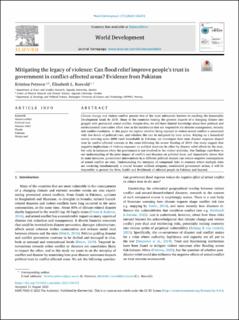| dc.contributor.author | Petrova, Kristina | |
| dc.contributor.author | Rosvold, Elisabeth Lio | |
| dc.date.accessioned | 2023-11-03T09:30:52Z | |
| dc.date.available | 2023-11-03T09:30:52Z | |
| dc.date.created | 2023-10-27T08:29:00Z | |
| dc.date.issued | 2023 | |
| dc.identifier.issn | 0305-750X | |
| dc.identifier.uri | https://hdl.handle.net/11250/3100450 | |
| dc.description.abstract | Climate change and violent conflict present two of the most substantial barriers to reaching the Sustainable Development Goals by 2030. Many of the countries bearing the greatest impacts of a changing climate also grapple with protracted armed conflict. Despite this, we still have limited knowledge about how political and environmental insecurities affect trust in the institutions that are responsible for disaster management, security and conflict resolution. In this paper we explore whether being exposed to violent armed conflict is associated with low levels of political trust, and whether this can be mitigated by state action. Relying on a household survey covering some 2000 rural households in Pakistan, we investigate how state disaster response shaped trust in conflict-affected contexts in the years following the severe flooding of 2010. Our study suggest that negative implications of violence exposure on political trust can be offset by disaster relief efforts by the state, but only in instances when the government is not involved in the violent activities. Our findings contribute to our understanding of the joint impact of conflict and disasters on political trust, and importantly shows that in some instances, government interventions in a different political domain can reduce negative consequences of armed conflict on trust. Understanding the interplay of compound risks in contexts where multiple risks are occurring simultaneously is crucial because without adequate, coordinated government action, it will be impossible to protect the lives, health and livelihoods of affected people in Pakistan and beyond. | en_US |
| dc.language.iso | eng | en_US |
| dc.publisher | Elsevier | en_US |
| dc.rights | Navngivelse 4.0 Internasjonal | * |
| dc.rights.uri | http://creativecommons.org/licenses/by/4.0/deed.no | * |
| dc.title | Mitigating the legacy of violence: Can flood relief improve people’s trust in government in conflict-affected areas? Evidence from Pakistan. | en_US |
| dc.title.alternative | Mitigating the legacy of violence: Can flood relief improve people’s trust in government in conflict-affected areas? Evidence from Pakistan. | en_US |
| dc.type | Peer reviewed | en_US |
| dc.type | Journal article | en_US |
| dc.description.version | publishedVersion | en_US |
| dc.source.volume | 173 | en_US |
| dc.source.journal | World Development | en_US |
| dc.source.issue | 106372 | en_US |
| dc.identifier.doi | https://doi.org/10.1016/j.worlddev.2023.106372 | |
| dc.identifier.cristin | 2189016 | |
| cristin.ispublished | true | |
| cristin.fulltext | original | |
| cristin.qualitycode | 2 | |

